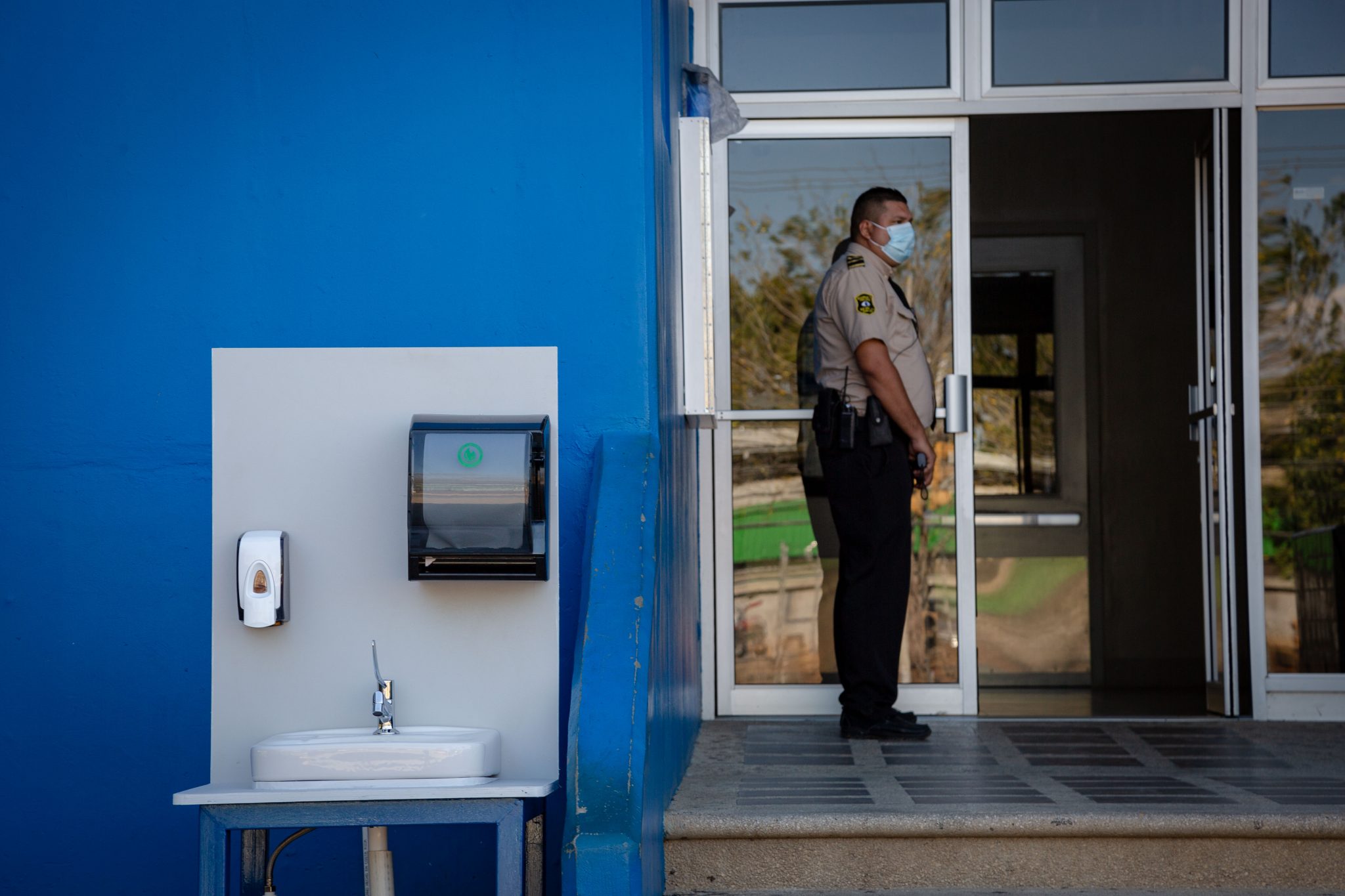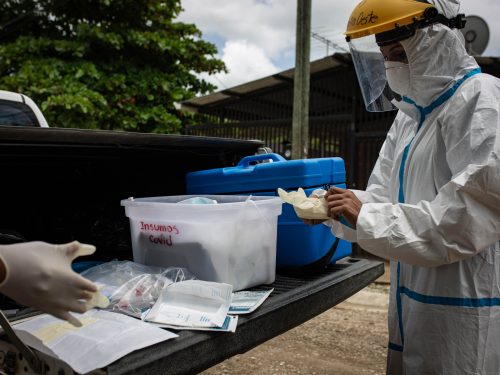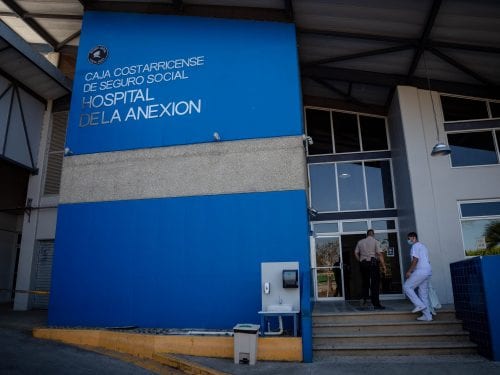
When a covid-19 patient in Guanacaste needs hospitalization, the Costa Rican Social Security Fund (CCSS) will transfer him to a hospital in the center of the country such as México, San Juan de Dios, Calderón Guardia or the Specialized Patient Care Center with COVID (Ceaco, former Cenare).
This is determined by a guideline issued by the Caja on April 14, which stipulates that regional and peripheral medical centers will not hospitalize covid-19 positive patients.
Guanacaste has nine beds in intensive care units, three in Nicoya and six in Liberia, but the president of the CCSS, Román Macaya, explained in a press conference that they want those beds available to attend people with other illnesses or emergencies.
He also indicated that, although hospitals are trained with “first-world” staff, the cases that are complicated will be better in places more specialized in COVID.
The guideline could be modified in the future according to the number and medical condition of the patients registered by the country, as well as the capacity of the health system, the CCSS press department told La Voz de Guanacaste.
To expand on this topic, The Voice of Guanacaste spoke with the director of La Anexión Hospital in Nicoya, Anner Angulo. In this interview, he explains how the medical center is preparing to take care of suspicious patients and to carry out the tests that detect covid-19. The transcript was slightly edited for space and precision.
La Voz: What have you been notified about the transfer of patients with covid-19, in case they require hospitalization, to central hospitals or Cenare?
Anner Angulo: The hospital is prepared to care for patients who are positive or suspected of covid-19. However, the institution established a national plan to centralize patients. There is a whole protocol for the transfer of the patient, where the driver, nurse, doctor, etc, are involved, as well as a whole team of human resources that is currently being trained.
La Voz: How many vehicles are equipped?
Anner Angulo: We have three vehicles equipped for the transfer of patients.
La Voz: What does it mean that the hospital is ready? Does it already have the equipment and staff?
Anner Angulo: Yes, the hospital, as I repeat, is prepared for the care of the covid patient. We have an entire emergency team, with its facilities, with ventilator machines and laboratory equipment, etc. We have an area dedicated to hospitalize these patients, what we call the covid area in the hospital, which is located on the first floor of the hospitalization tower.
There is a human resource of specialist doctors, general practitioners, respiratory therapists, equipment, monitors, ventilators, sterilizer, etc. A series of human and technological equipment for patient that requires specialized care.
La Voz: So the hospital has an area for positive patients because, in the event that someone requires hospitalization, they must first stabilize him and then transfer him to San José. Is that so?
Anner Angulo: Yes. When we have a suspected coronavirus case [requiring hospitalization], we handle it in the covid area while laboratory tests come out confirming whether or not you have the coronavirus. If the patient tests positive for coronavirus, we coordinate with the Covid Command to transfer this patient.
If the Covid Command says that it does not have capacity in national hospitals, we have enough capacity to care for these patients because we have the specialists, equipment, and medications necessary for care.
La Voz: How many staff is or would be assigned to this covid area?
Anner Angulo: It will depend. As the number of patients progresses, so the number of officials. The institution (CCSS) has decided, through the board of directors, to hire human resources as required. At this time, the hospital is not requiring it because we do not have positive hospitalized cases nor do we have the number of patients required for care.
La Voz: So the assigned staff varies according to the internments? Are there regular evaluations?
Anner Angulo: Yes. We see this in different scenarios: green, yellow and red scenery. The green stage is the one we are in right now, which is like the preparatory act. If we have a patient, we will take care of them. In the yellow scenario is that we have more than five or eight cases, and the red scenario is that the cases exceed 12 hospitalized.
La Voz: How many ventilators do you have in La Anexión?
Anner Angulo: It is going to depend on the number of patients that require ventilation, so it can be 6, 12, 18 or 20, so we rotate the equipment towards the covid area.
La Voz: But right now do you have a certain number?
Anner Angulo: Yes. In the green stage we have six designated ventilators for the covid area and as the scenarios progress, we are going to assign more ventilators.
La Voz: The good news is that they are going to regionalize the tests and they have talked about distributing them in the different hospitals. Is La Anexión one of the hospitals that will receive the equipments?
Anner Angulo: The hospital will be benefit from carrying out tests to detect the virus. But beyond saying that we have the laboratory tests, the most important thing is that the people of the community and all our users pay attention to the indications that the Health Minister and the president of the CCSS say. We gain nothing by having 50 ventilators if people ignore all the isolation protocols, the handwashing protocol, not crowding people, because there is no health system that can attend to a large number of users. That has a social impact and an economic impact for which we are not yet prepared.
La Voz: How many beds do you have right now in the covid area?
Anner Angulo: At the moment we have twelve beds, six already available [located in the covid area] and as we move forward we could have up to 32 hospitalized patients.
La Voz: Have you discussed or have information about when the tests will arrive at the hospital?
Anner Angulo: At the end of this month we will be already carrying out the tests.
La Voz: Is the staff already in training?
Anner Angulo: Obviously, laboratory professionals must be trained to carry out tests such as the use of equipment, how to use personal protection, etc. This is an entire process that must be done and ensure the safety of both officials and that the test results are also reliable.
La Voz: What personal protective equipment do you currently have in La Anexión for pandemic care?
Anner Angulo: At this time we have the protection equipment for the indication of any patient that have covid or is a suspect of covid for the different services. The institution has been providing us with supplies or protective equipment as we acquire them at the country level. Let’s remember that supplies right now are an international necessity.
La Voz: Right now, do you feel safe with the amount of inventory you have?
Anner Angulo: For the initial treatment, obviously we do have.
La Voz: What do you mean by initial treatment?
Anner Angulo: We have for initial case management. To tell you, I have a thousand personal protective equipment with gloves, face masks, masks, etc. We have enough for the care of the covid patient. Obviously if the cases go up disproportionately, there will not be enough amount of protective gear.
La Voz: Is that the amount the hospital has right now, 1,000?
Anner Angulo: I cannot tell you the amount we have because right now I do not handle the precise data, but we do have enough material or personal protective equipment.
La Voz: Is there anything that worries you about this situation, about how the hospital is equipped, about how the medical staff feel?
Anner Angulo: In the hospital we have done different trainings. We have worked to manage the mental health part of our workers and also in the different guidelines, such as in the use of personal protective equipment, in the management of the positive covid patients. We have been working all these areas to guarantee a fairly optimal or adequate quality of care.
La Voz: How do you feel the emergency has impacted the mental health of medical personnel?
Anner Angulo: Obviously we are human beings and we have fears because we have family, parents, children, some with risk factors. All this causes fear in the workers. At the beginning there was collective hysteria in the population, in the workers, but as the trainings were given with psychologists, with a social worker, with psychiatrists, with a series of mental health teams, it has been adequately addressed and emotionally we feel a little bit more prepared.
Each leadership is aware of these workers and as cases appear, whether suspicious or positive, we identify the officials and address them emotionally with the mental health team.







Comments